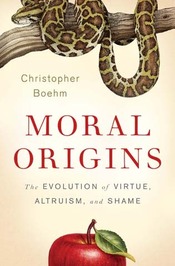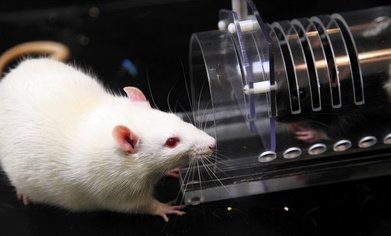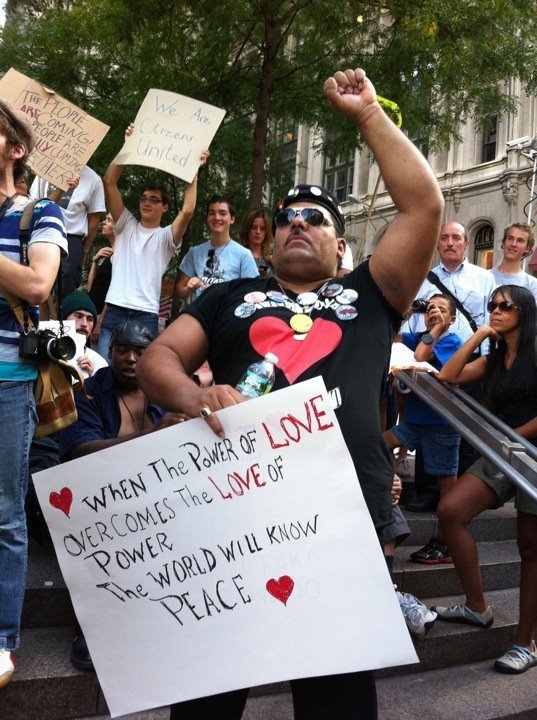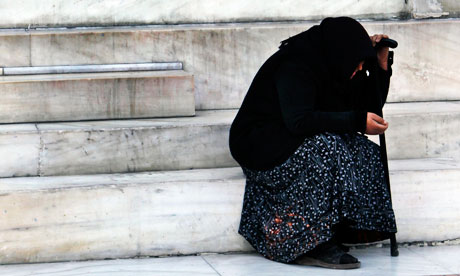It's Natural to want to Help others;
|
Being Human
|
The Empathic Civilization, Jeremy Rifkin and RSA
For more, here's Rifkin's essay in the Huffington Post
And you can buy the book here: http://www.betterworldbooks.com a social enterprise...
VS Ramachandran: The neurons that shaped civilizationThe existence of mirror neurons means, "There is no real independent self, aloof from other human beings, inspecting the world, inspecting other people. You are, in fact, connected not just via Facebook and Internet, you’re actually quite literally connected by your neurons.” (Vilayanur Ramachandran) TED Talk (7.44 mins.)
If this is so, then why does our economic system impel us to compete against each other, to set ourselves apart from one another? Why should our economic system violate our fundelmental humaness, our connectedness? Because it is designed by pleonexic psychopaths--those who do not or cannot feel what other people feel and whose drive to accumulate is never sated. Our economic system is not science at all, but instead disconnected from reality, separated and designed by those suffering pleonexia. |
Do Mirror Neurons Give Us Empathy?An interview with V.S Ramachandran, professor of Neuroscience and Psychology and Director of Center for Brain and Cognition at the University of California at San Diego, at the Being Human conference in San Francisco, March 29, 2012
|
Noble Savages: A book review by Jag Bhalla in The Wilson Quarterly
MORAL ORIGINS:
The Evolution of Virtue, Altruism, and Shame.

By Christopher Boehm.
Basic Books. 418 pp. $28.99
The stories we’ve been told about the role of competition in our evolution have been unnaturally selective. Sound-bite pop science, of the “red in tooth and claw” and “selfish gene” variety, has left out much that is essential to human nature. Anthropologist Christopher Boehm aims to resurrect some of those missing elements in Moral Origins. In his view, cooperation, along with the traits and rules needed to make it work, was as essential to our survival as large brains.
Boehm has spent 40 years studying hunter-gatherers and the behavior of our primate cousins. His book’s explanatory quest started with a 10-year review of all 339 hunter-gatherer cultures ethnographers have described, 150 of which were deemed representative of our ancestors. Fifty of these have so far been coded into a detailed database. Boehm says this deep data set shows that we have been “vigilantly egalitarian for tens of thousands of years.” (emphasis ed.)
The dominant view of human evolution against which Boehm deploys his arguments and data is well summarized in evolutionary biologist Richard Dawkins’s hugely influential 1976 book The Selfish Gene. Dawkins famously warned that “if you wish . . . to build a society in which individuals cooperate generously and unselfishly towards a common good, you can expect little help from biological nature.” In nature, he declared, there is “no welfare state.” Indeed, he wrote, “any altruistic system is inherently unstable, because it is open to abuse by selfish individuals, ready to exploit it.” These ideas, aided by others’ similar claims, became barrier beliefs, preventing further analysis for decades.
continue...
Basic Books. 418 pp. $28.99
The stories we’ve been told about the role of competition in our evolution have been unnaturally selective. Sound-bite pop science, of the “red in tooth and claw” and “selfish gene” variety, has left out much that is essential to human nature. Anthropologist Christopher Boehm aims to resurrect some of those missing elements in Moral Origins. In his view, cooperation, along with the traits and rules needed to make it work, was as essential to our survival as large brains.
Boehm has spent 40 years studying hunter-gatherers and the behavior of our primate cousins. His book’s explanatory quest started with a 10-year review of all 339 hunter-gatherer cultures ethnographers have described, 150 of which were deemed representative of our ancestors. Fifty of these have so far been coded into a detailed database. Boehm says this deep data set shows that we have been “vigilantly egalitarian for tens of thousands of years.” (emphasis ed.)
The dominant view of human evolution against which Boehm deploys his arguments and data is well summarized in evolutionary biologist Richard Dawkins’s hugely influential 1976 book The Selfish Gene. Dawkins famously warned that “if you wish . . . to build a society in which individuals cooperate generously and unselfishly towards a common good, you can expect little help from biological nature.” In nature, he declared, there is “no welfare state.” Indeed, he wrote, “any altruistic system is inherently unstable, because it is open to abuse by selfish individuals, ready to exploit it.” These ideas, aided by others’ similar claims, became barrier beliefs, preventing further analysis for decades.
continue...
"Empathy is not simply a matter of trying to imagine what others are going through, but having the will to muster enough courage to do something about it." --Cornel West
Here’s Richard Wilkinson’s TED Talk on the far-reaching harm done by Inequality...
A British researcher and professor of social epidemiology at the Universities of Nottingham and London discussing the findings from his latest book, (with Karen Pickett) The Spirit Level: Why Greater Equality Makes Societies Stronger (Bloomsbury Press, 2009) and ongoing research. “The societies that do worse, whatever the outcome [measured],” says Wilkinson, “seem to be the more unequal ones.” And he adds, “It’s not just a little worse, but twice or even ten times worse” than the more equal societies. “…bigger income gaps lead to deteriorations in:-
· Social Relations: child conflict, homicide, imprisonment, social capital and trust; · Health: drug abuse, infant mortality, life expectancy, mental illness and obesity; · Human Capital: child well-being, high school drop outs, math and literacy schools, social mobility and teenage births” The psycho-social effects of inequality are significantly damaging, setting up an environment permeated by stress, a world of "status competition [and] social evaluation anxiety" which increases the "drive to consumerism" since possessions and wealth determine status. |
Thus concludes Wilkinson, “What we’re looking at is general social dysfunction…it’s not just one or two things that go wrong, but most things.”
The power of pleonexic psychopaths to accumulate wealth--and to maintain their system--is a central cause of most of our social, economic and ecological problems. But worse, their power creates an environment of stress, of dis-ease and unhappiness, a perverse and unnatural world in which only they can thrive. Wilkinson's website: equalitytrust.org.uk |
We Are Hard-Wired to Care and Connect
The good news: The changes we must make to avoid ultimate collapse are identical to the changes we must make to create the world of our common dream.
by David Korten posted Jul 30, 2008 at Yes! Magazine
The story of purple America is part of a yet larger human story. For all the cultural differences reflected in our richly varied customs, languages, religions, and political ideologies, psychologically healthy humans share a number of core values and aspirations. Although we may differ in our idea of the “how,” we want healthy, happy children, loving families, and a caring community with a beautiful, healthy natural environment. We want a world of cooperation, justice, and peace, and a say in the decisions that affect our lives. The shared values of purple America manifest this shared human dream. It is the true American dream undistorted by corporate media, advertisers, and political demagogues—the dream we must now actualize if there is to be a human future.
For the past 5,000 years, we humans have devoted much creative energy to perfecting our capacity for greed and violence—a practice that has been enormously costly for our children, families, communities, and nature. Now, on the verge of environmental and social collapse, we face an imperative to bring the world of our dreams into being by cultivating our long-suppressed, even denied, capacity for sharing and compassion. (emphasis added) Despite the constant mantra that “There is no alternative” to greed and competition, daily experience and a growing body of scientific evidence support the thesis that we humans are born to connect, learn, and serve and that it is indeed within our means to:
David Korten, PhD is co-founder of Yes! Magazine and serves on a number of boards including BALLE (Business Alliance for Local Living Economies). His latest book, Agenda For a New Economy: A Declaration of Independence from Wall Street, is available here.
The story of purple America is part of a yet larger human story. For all the cultural differences reflected in our richly varied customs, languages, religions, and political ideologies, psychologically healthy humans share a number of core values and aspirations. Although we may differ in our idea of the “how,” we want healthy, happy children, loving families, and a caring community with a beautiful, healthy natural environment. We want a world of cooperation, justice, and peace, and a say in the decisions that affect our lives. The shared values of purple America manifest this shared human dream. It is the true American dream undistorted by corporate media, advertisers, and political demagogues—the dream we must now actualize if there is to be a human future.
For the past 5,000 years, we humans have devoted much creative energy to perfecting our capacity for greed and violence—a practice that has been enormously costly for our children, families, communities, and nature. Now, on the verge of environmental and social collapse, we face an imperative to bring the world of our dreams into being by cultivating our long-suppressed, even denied, capacity for sharing and compassion. (emphasis added) Despite the constant mantra that “There is no alternative” to greed and competition, daily experience and a growing body of scientific evidence support the thesis that we humans are born to connect, learn, and serve and that it is indeed within our means to:
- Create family-friendly communities in which we get our satisfaction from caring relationships rather than material consumption;
- Achieve the ideal, which traces back to Aristotle, of creating democratic middle-class societies without extremes of wealth and poverty; and
- Form a global community of nations committed to restoring the health of the planet and sharing Earth’s bounty to the long-term benefit of all
David Korten, PhD is co-founder of Yes! Magazine and serves on a number of boards including BALLE (Business Alliance for Local Living Economies). His latest book, Agenda For a New Economy: A Declaration of Independence from Wall Street, is available here.
|
|
My Stroke of Insight, Jill Bolte Taylor, PhDIn 1996 Jill Bolte Taylor, a neuro-anatomist doing research with the Harvard Brain Bank, watched herself having a stroke that wiped out the left side of her brain. After a near death experience and a 10 year recovery, she wrote this book to share with the world what she found out about the different hemispheres of our brain and their radically different--even oppositional--ways of viewing the world.
“Our left hemisphere is linear—all about the past, and the future. Its job is to collect info from the collage and project into the future all of our possibilities… |
|
"It is a calculating intelligence that reminds me when to do the laundry, but most importantly it is the little voice that says ‘I am’,” and separates us as individuals from those around us."
“The right brain is all about this present moment…it’s all about right here, right now…it thinks in pictures….and learns from the kinetic movement of my body” and all its senses... “I am an energy being connected to the energy all around me through the consciousness of my right hemisphere—we are all energy beings connected to each other by this hemisphere as one human family. In this moment we are perfect, we are whole and we are beautiful...” "We are the life-force power of the universe—with two cognitive minds. We have the power, moment to moment, to choose how we want to be in the world...we can choose to step into the consciousness of our right brain where we are at one with all that is…or I can choose the consciousness of my left hemisphere where I become solitary, and individual apart from everyone." "Which would you choose? Which do you chose? I believe the more we can go to our right brain the more peaceful and beautiful the world will be…" "I thought that was an idea worth spreading." Buy her book here |
Editor's note: Until the late 1980's the right brain was thought to be nearly useless at best, and often an impediment to any kind of success at worst. This notion of success was of course defined by the social and economic paradigm then, and still is today--competition and accumulation. Increasingly new research on the right brain is finding the kind of value Dr. Bolte Taylor has found, deep and lasting value. It is the hemisphere that both fuels creativity and brings us together, and it is the part of the brain we must access to build a new world, to create new frames of understanding, new ideas about community, sustainability, success and what it means to live a full life. When Einstein said "You can't solve problems using the same thinking that created them," this is what he meant.
Greece on the breadline: cashless currency takes off
|
U. of C. Study finds in rats a touch of, uh, humanity By William Mullen
|
 Look closely, the black rat is trapped
Look closely, the black rat is trapped
Researcher Peggy Mason at University of Chicago with Follow-up Study on Rats.
Chicago Tribune
Study: Rats are nice to one another
U. of C. study suggests the rodents are influenced by social experience
U. of C. neurobiologist Peggy Mason’s research began by placing young albino rats with litters of the black-hooded strain. ( Photo credit: Kevin Jiang, University of Chicago / January 15, 2014)
By Naheed Rajwani, Tribune reporter
10:38 p.m. CST, January 15, 2014
Chicago Tribune
Study: Rats are nice to one another
U. of C. study suggests the rodents are influenced by social experience
U. of C. neurobiologist Peggy Mason’s research began by placing young albino rats with litters of the black-hooded strain. ( Photo credit: Kevin Jiang, University of Chicago / January 15, 2014)
By Naheed Rajwani, Tribune reporter
10:38 p.m. CST, January 15, 2014
A young albino rat is separated from its litter and placed in a litter of black-hooded rats. Until it reaches adulthood, the albino rat will interact exclusively with a black-caped mother and littermates.
If the rat has the opportunity to help another rat, will it prefer helping someone from its own strain, or someone from the strain in which it was fostered?
Research from the University of Chicago shows rats will choose the latter.
The peer-reviewed study argues that rats choose whom to help based on social experiences rather than genetics.
The research, published in the open access eLife Journal this week, stems from a 2011 study also done at U. of C. that suggested rats exhibited empathy like behavior by trying to free their cage mate from a restrainer. [See above Tribune story above] In the more recent study, researchers wanted to see if rats would extend that behavior to strangers, said Peggy Mason, a professor of neurobiology who was on the research team.
Initially, the researchers tested whether rats were innately motivated to help others of their own strain. The rats were more willing to help members of their strain than animals from an unfamiliar strain.
To test whether familiarity with a strain drove decision-making, researchers paired an albino rat with a black-caped rat for two weeks. The albino rat was then re-housed with an albino cage mate for a week and then placed near a different black-caped rat trapped inside a clear restrainer. Every day for 12 days, the albino met a new stranger.
The researchers found that the albino rat was willing to help the black-caped rat if it had interacted with a rat from the same species. In many cases, the rat spent days trying to learn how to open the restrainer's door, researchers said.
The albino rat's behavior says a lot about social experience and how it can shape pro-social behavior — actions that improve others' well-being — said Inbal Ben-Ami Bartal, a postdoctoral student at the university and the study's first author. [Emphasis added]
"This (part) shows that rats are capable of meeting a stranger that they've never met before and making a choice of how they should act toward that stranger," she said.
...continue reading at Chicago Tribune
The upshot here is that environment matters--natural, social and built. And it matters more than anything else. Following Darwin, beings adapt to their environment: if it is violent, acquisitive and competitive then beings within that environment will exhibit those characteristics. The social progressives of the late 19th and early 20th century who believed a good society could be fostered were right (you knew they were, mistakes notwithstanding!) People like Jane Addams (1860-1935) [1] understood that neither she, nor the larger society could function well with endemic poverty, inequality and environmental degradation--these are all structural flaws resulting from understanding the world as hierarchical. Critically Addams understood that the "other" living in poverty on the near west side of Chicago were just like her--in fact humans are nearly identical genetically, and we now understand that we share far greater genetic material with all beings than we had previously realized. So what matters is this: do we adopt an understanding which sees the world as hierarchical and competitive--an epistemology proffered by the few who profit from that understanding? Or do we see through that deception and find a flat ontology, one in which beings sometimes compete but most often cooperate?
Your choice.
[1] See Addam's Democracy and Social Ethics (Univ. of IL Press 2002) Full original text (Macmillan 1902) here and Stanford Encyclopedia of Philosophy, here "...the first woman 'public philosopher' in United States history...largely ignored until the 1990s."
If the rat has the opportunity to help another rat, will it prefer helping someone from its own strain, or someone from the strain in which it was fostered?
Research from the University of Chicago shows rats will choose the latter.
The peer-reviewed study argues that rats choose whom to help based on social experiences rather than genetics.
The research, published in the open access eLife Journal this week, stems from a 2011 study also done at U. of C. that suggested rats exhibited empathy like behavior by trying to free their cage mate from a restrainer. [See above Tribune story above] In the more recent study, researchers wanted to see if rats would extend that behavior to strangers, said Peggy Mason, a professor of neurobiology who was on the research team.
Initially, the researchers tested whether rats were innately motivated to help others of their own strain. The rats were more willing to help members of their strain than animals from an unfamiliar strain.
To test whether familiarity with a strain drove decision-making, researchers paired an albino rat with a black-caped rat for two weeks. The albino rat was then re-housed with an albino cage mate for a week and then placed near a different black-caped rat trapped inside a clear restrainer. Every day for 12 days, the albino met a new stranger.
The researchers found that the albino rat was willing to help the black-caped rat if it had interacted with a rat from the same species. In many cases, the rat spent days trying to learn how to open the restrainer's door, researchers said.
The albino rat's behavior says a lot about social experience and how it can shape pro-social behavior — actions that improve others' well-being — said Inbal Ben-Ami Bartal, a postdoctoral student at the university and the study's first author. [Emphasis added]
"This (part) shows that rats are capable of meeting a stranger that they've never met before and making a choice of how they should act toward that stranger," she said.
...continue reading at Chicago Tribune
The upshot here is that environment matters--natural, social and built. And it matters more than anything else. Following Darwin, beings adapt to their environment: if it is violent, acquisitive and competitive then beings within that environment will exhibit those characteristics. The social progressives of the late 19th and early 20th century who believed a good society could be fostered were right (you knew they were, mistakes notwithstanding!) People like Jane Addams (1860-1935) [1] understood that neither she, nor the larger society could function well with endemic poverty, inequality and environmental degradation--these are all structural flaws resulting from understanding the world as hierarchical. Critically Addams understood that the "other" living in poverty on the near west side of Chicago were just like her--in fact humans are nearly identical genetically, and we now understand that we share far greater genetic material with all beings than we had previously realized. So what matters is this: do we adopt an understanding which sees the world as hierarchical and competitive--an epistemology proffered by the few who profit from that understanding? Or do we see through that deception and find a flat ontology, one in which beings sometimes compete but most often cooperate?
Your choice.
[1] See Addam's Democracy and Social Ethics (Univ. of IL Press 2002) Full original text (Macmillan 1902) here and Stanford Encyclopedia of Philosophy, here "...the first woman 'public philosopher' in United States history...largely ignored until the 1990s."
Our brains dislike inequality, even when it's in our favorElizabeth Weise USA Today February 25,2010
When children whine "It's not fair!" they're not just doing it to be annoying -- their brains are hardwired to prefer equality in the doling out of everything from candy to money. Researchers at California Institute of Technology and Trinity College in Dublin, Ireland, used an MRI to look at how the brain processes rewards. Their research is published in today's edition of the journal Nature. ...John O' Doherty, a professor of psychology at Caltech, said in a statement. "It shows that the basic reward structures in the human brain are sensitive to even subtle differences in social context. "It appears, he says, that "even the basic reward structures in the human brain are not purely self-oriented," something economics and psychologists have always assumed to be the case. Editor's note: this last is critical, the assumptions of economists, and psychologists, are wrong. People are not primarily self-interested--they are trapped in a system that promotes, even requires acting out of self-interest. |
Low-Income People Quicker to Show Compassion
By Yasmin Anwar | December 20, 2011
New research by GGSC graduate fellow Jennifer Stellar finds that upper classes are less able to recognize suffering. Emotional differences between the rich and poor, as depicted in such Charles Dickens classics as “A Christmas Carol” and “A Tale of Two Cities,” may have a scientific basis. Researchers at the University of California, Berkeley, have found that people in the lower socio-economic classes are more physiologically attuned to suffering, and quicker to express compassion than their more affluent counterparts. By comparison, the UC Berkeley study found that individuals in the upper middle and upper classes were less able to detect and respond to the distress signals of others. Overall, the results indicate that socio-economic status correlates with the level of empathy and compassion that people show in the face of emotionally charged situations. Continue: Editors note: This study is revealing but should not be too surprising...see Pleonexia and the Psychopath, and note that wealth is not the problem, but the unbalanced pursuit of wealth is... |
Capuchin Monkeys Refuse Snacks from Selfish People
July 31, 2013 | 2,502 views
By Dr. Becker A study at the University of Stirling in the U.K. demonstrated that capuchin monkeys will refuse food treats offered by selfish humans. According to study author James Anderson, a comparative psychologist, the human trait of developing impressions about others based on our observations of them, is probably found in other species as well. Monkeys Refuse Treats from Uncooperative Humans For the study, published recently in Nature Communications [1], Anderson selected capuchins because they are known to be highly social and cooperative. The monkeys looked on as one person either agreed or refused to help another person open a jar that held a toy. Then both people offered a food treat to the monkey, who was allowed to take a treat from only one person. When the capuchins were offered a treat from pairs that included a helpful human, they were just as likely to take a treat from either person. But when offered a treat by people who had refused to help their experiment partner, all seven monkeys were more likely to refuse it. The researchers tested different scenarios to try to discover what actually caused the capuchins to refuse treats. They instructed the “refusers” to busy themselves opening their own jars as a way of avoiding helping their partners. In this instance, the monkeys showed no bias against those who didn’t help, but continued to avoid accepting treats from people who were available to help but did not. |
Can Capuchins Identify Undesirable Social Partners?
According to Kiley Hamlin, a developmental psychologist at the University of British Columbia in Vancouver, “Explicit refusal to help is a signal that you’re dangerous, that you’re negative.” He says this most recent study indicates that the ability to identify undesirable social partners is instinctual for certain species. Jennifer Vonk, a comparative psychologist and author of a study of chimpanzees published in 2008, believes the capuchin study results shouldn’t be taken as proof that monkeys understand human character traits. Vonk believes additional tests are needed to further explore the capuchins’ preferences and motivations. She would also like to see more studies on other types of social and even non-social animals as well, to see if watching social interactions impacts their behavior. [1] |
|
Occupy Love "will feature an incredible cast of visionaries, both the well known, and the everyday heroes who are emerging in this fledgling movement. So far we have interviewed: Charles Eisenstein [in this clip], Marina Sitrin, Jydy Rebick, The Yes Men, Angaanaq, Clayton Thomas Muller, Tom Goldtooth, Bill McKibben, Malik from Occupy the Hood, Rebecca Solnit, Drew Dillinger, Don Tapscott, Jeremy Rifkin, Asmaa Mahfouz, Penny Livingston Stark, Rob Hopkins, and more."
more... |
Occupy Love, A film by Velcrow Ripper...a short clip of a film in progress:
Occupy Love will be a moving, transformative feature documentary that asks the question: how are the economic and ecological crises we are facing today a great love story? A profound shift is taking place all over the world. Humanity is waking up to the fact that the current system that dominates the planet is failing to provide us with health, happiness or meaning. The dominant paradigm is based on separation, as exemplified by the financial system, and the corporate emphasis of profits before people.
|
“I have travelled around the world tracing this phenomenal year of change, of global transformation,” Ripper told me in an e-mail...and I have found that the underlying thread that connects the dots is really love. It is a love of justice, it is a love of humanity, and it is a deep sense of interdependence.”
Ripper says we live in “a nightmare paradigm of a commodified world, a lifeless world of objects, separation and scarcity. We are awakening to a new possibility, where the true abundance of this Earth is no longer hoarded. Where relationships are not transactions. Where your well being is my well being is the planet’s well being.” In these Times February 9, 2012
Ripper says we live in “a nightmare paradigm of a commodified world, a lifeless world of objects, separation and scarcity. We are awakening to a new possibility, where the true abundance of this Earth is no longer hoarded. Where relationships are not transactions. Where your well being is my well being is the planet’s well being.” In these Times February 9, 2012
THE NATION, December 22, 2011
|
In These Times, Feb. 9, 2012
|
"A Paradise Built in Hell," Rebecca Solnit
A NYT Review by Dwight Garner August 21, 2009

Rebecca Solnit, Jim Herrington, NYT
...Her new book, “A Paradise Built in Hell,” is an investigation not of a thought but of an emotion: the fleeting, purposeful joy that fills human beings in the face of disasters like hurricanes, earthquakes and even terrorist attacks. These are clearly not events to be wished for, Ms. Solnit writes, yet they bring out the best in us and provide common purpose. Everyday concerns and societal strictures vanish. A strange kind of liberation fills the air. People rise to the occasion. Social alienation seems to vanish.
“What is this feeling that crops up during so many disasters?” Ms. Solnit asks. She describes it as “an emotion graver than happiness but deeply positive,” worth studying because it provides “an extraordinary window into social desire and possibility.” Our response to disaster gives us nothing less than “a glimpse of who else we ourselves may be and what else our society could become.” Her overarching thesis can probably be boiled down to this sentence: “The recovery of this purpose and closeness without crisis or pressure” — without disaster, that is — “is the great contemporary task of being human.” Buy the book at betterworldbooks.com
“What is this feeling that crops up during so many disasters?” Ms. Solnit asks. She describes it as “an emotion graver than happiness but deeply positive,” worth studying because it provides “an extraordinary window into social desire and possibility.” Our response to disaster gives us nothing less than “a glimpse of who else we ourselves may be and what else our society could become.” Her overarching thesis can probably be boiled down to this sentence: “The recovery of this purpose and closeness without crisis or pressure” — without disaster, that is — “is the great contemporary task of being human.” Buy the book at betterworldbooks.com
Why War Isn't Inevitable: A Scientist Studies the Secret to Peaceful Societies
By Brad Jacobson, AlterNet March 18, 2012
When President Obama accepted the Nobel Peace Prize in 2009, he expressed a well-worn notion about warfare: "[W]ar is sometimes necessary, and war is at some level an expression of human feelings." Today, as the drumbeats for war with Iran once again reach bellicose heights, a timely new book argues that, contrary to conventional wisdom, waging war is not an innate part of human nature.
In The End of War, veteran science journalist John Horgan applies the scientific method to reach a unique conclusion: biologically speaking, we are just as likely to be peaceful as we are to be violent. So what keeps humans bound by a seemingly never-ending cycle of war?
In a phone interview with AlterNet from his home in New York's Hudson Valley -- situated within earshot of the mortars and howitzers at West Point Military Academy's artillery range -- Horgan dispelled multiple myths about the impetus for war, the combination of which, he believes, sustains the institution of war despite rational thought and an overwhelming human aversion to killing. A longtime Scientific American writer and director of the Center for Science Writings at the Stevens Institute of Technology in Hoboken, New Jersey, Horgan also charts a new course for rejecting the old paradigm of war's inevitability and finally releasing mankind from its destructive grip.
continue to the interview...
In The End of War, veteran science journalist John Horgan applies the scientific method to reach a unique conclusion: biologically speaking, we are just as likely to be peaceful as we are to be violent. So what keeps humans bound by a seemingly never-ending cycle of war?
In a phone interview with AlterNet from his home in New York's Hudson Valley -- situated within earshot of the mortars and howitzers at West Point Military Academy's artillery range -- Horgan dispelled multiple myths about the impetus for war, the combination of which, he believes, sustains the institution of war despite rational thought and an overwhelming human aversion to killing. A longtime Scientific American writer and director of the Center for Science Writings at the Stevens Institute of Technology in Hoboken, New Jersey, Horgan also charts a new course for rejecting the old paradigm of war's inevitability and finally releasing mankind from its destructive grip.
continue to the interview...
Affluent People More Likely to be Scofflaws
By Yasmin Anwar | February 28, 2012
The upper class has a higher propensity for unethical behavior, being more likely to believe—as did Gordon Gekko in the movie “Wall Street”—that “greed is good,” according to a new study from the University of California, Berkeley.
In seven separate studies conducted on the UC Berkeley campus, in the San Francisco Bay Area and nationwide, UC Berkeley researchers consistently found that upper-class participants were more likely to lie and cheat when gambling or negotiating; cut people off when driving, and endorse unethical behavior in the workplace.
“The increased unethical tendencies of upper-class individuals are driven, in part, by their more favorable attitudes toward greed,” said Paul Piff, a doctoral student in psychology at UC Berkeley and lead author of the paper published on Feb. 27 in the journal Proceedings of the National Academy of Sciences.
continue reading...
In seven separate studies conducted on the UC Berkeley campus, in the San Francisco Bay Area and nationwide, UC Berkeley researchers consistently found that upper-class participants were more likely to lie and cheat when gambling or negotiating; cut people off when driving, and endorse unethical behavior in the workplace.
“The increased unethical tendencies of upper-class individuals are driven, in part, by their more favorable attitudes toward greed,” said Paul Piff, a doctoral student in psychology at UC Berkeley and lead author of the paper published on Feb. 27 in the journal Proceedings of the National Academy of Sciences.
continue reading...
|
|
The Global Village Construction SetThe Tecumseh Project is not about how to practically build a new world; it is about discovering that we can and why we should. We believe a critical mass of understanding must be created to enable the many practical ideas that many creative and talented people are offering to take root and grow. A new world cannot grow in toxic soil.
This 4 min. TED Talk is irresistible to us--it is a man so down to earth that he wants to share with everyone the knowledge of creating the means of production necessary for life. He is not patenting these ideas in order to seek venture funding and launch an IPO so he can get rich. He doesn't want that much, not much more than a livable world. Here's his website: Open Source Ecology |





